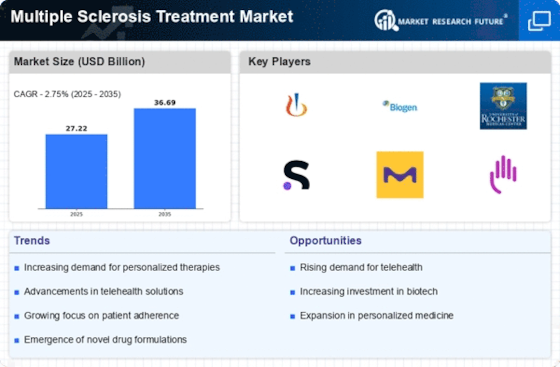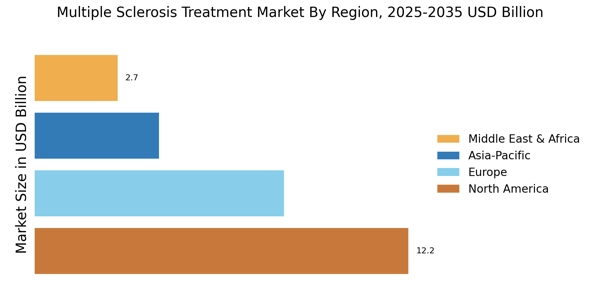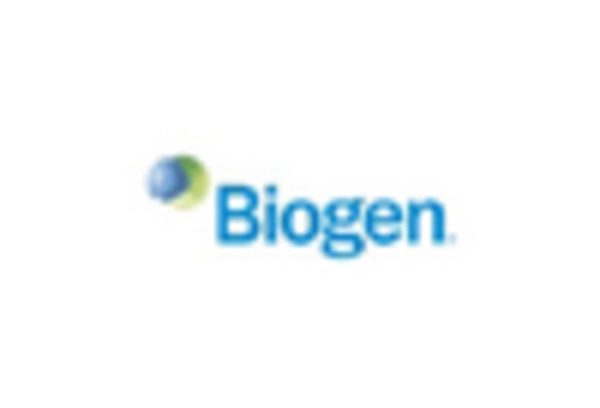Rising Prevalence of Multiple Sclerosis
The increasing incidence of Multiple Sclerosis (MS) is a pivotal driver for the Multiple Sclerosis Treatment Market. Recent estimates indicate that approximately 2.3 million individuals are affected by MS worldwide, with a notable rise in cases reported in various regions. This surge in prevalence necessitates the development and availability of effective treatment options, thereby propelling market growth. As healthcare systems strive to address the needs of this growing patient population, pharmaceutical companies are likely to invest more in research and development of innovative therapies. The demand for disease-modifying therapies (DMTs) is particularly pronounced, as these treatments aim to slow disease progression and improve quality of life for patients. Consequently, the rising prevalence of MS is expected to significantly influence the dynamics of the Multiple Sclerosis Treatment Market.
Growing Awareness and Education Initiatives
The growing awareness surrounding Multiple Sclerosis is a vital driver for the Multiple Sclerosis Treatment Market. Educational initiatives aimed at both healthcare professionals and the general public are enhancing understanding of MS, its symptoms, and available treatment options. This increased awareness is likely to lead to earlier diagnosis and intervention, which can significantly improve patient outcomes. Furthermore, advocacy groups and organizations are actively promoting awareness campaigns that highlight the importance of timely treatment. As patients become more informed about their condition, they are more likely to seek medical advice and explore treatment options. This shift in patient behavior is expected to drive demand for therapies within the Multiple Sclerosis Treatment Market. Consequently, the emphasis on education and awareness is likely to play a crucial role in shaping market dynamics.
Regulatory Support for Innovative Therapies
Regulatory support for innovative therapies is emerging as a key driver in the Multiple Sclerosis Treatment Market. Regulatory agencies are increasingly recognizing the need for expedited approval processes for novel treatments that demonstrate significant benefits for patients. This trend is particularly relevant in the context of MS, where the urgency for effective therapies is paramount. Recent initiatives aimed at streamlining the approval process for breakthrough therapies are likely to encourage pharmaceutical companies to invest in the development of new treatments. Additionally, the establishment of clear regulatory pathways for gene therapies and other advanced modalities is expected to further stimulate innovation in the market. As a result, the supportive regulatory environment is anticipated to facilitate the introduction of new therapies, thereby enhancing the overall landscape of the Multiple Sclerosis Treatment Market.
Technological Advancements in Treatment Options
Technological innovations are transforming the landscape of the Multiple Sclerosis Treatment Market. The advent of novel therapies, including monoclonal antibodies and oral medications, has expanded the treatment arsenal available to healthcare providers. For instance, recent advancements in biotechnology have led to the development of targeted therapies that specifically address the underlying mechanisms of MS. This shift towards more effective and personalized treatment options is likely to enhance patient outcomes and adherence to therapy. Furthermore, the integration of digital health solutions, such as telemedicine and mobile health applications, is facilitating better management of MS. These technologies enable patients to monitor their symptoms and treatment responses more effectively, thereby contributing to improved overall care. As a result, the ongoing technological advancements are expected to play a crucial role in shaping the Multiple Sclerosis Treatment Market.
Increased Investment in Research and Development
Investment in research and development (R&D) is a critical driver for the Multiple Sclerosis Treatment Market. Pharmaceutical companies are increasingly allocating resources to discover and develop new therapies that can address the unmet needs of MS patients. Recent data suggests that R&D spending in the neurology sector has seen a substantial increase, with a focus on innovative treatment modalities. This trend is indicative of a broader commitment to advancing the understanding of MS and its pathophysiology. Additionally, collaborations between academic institutions and industry players are fostering a conducive environment for groundbreaking research. The potential for novel therapies to enter the market not only enhances treatment options but also stimulates competition among manufacturers, ultimately benefiting patients. Therefore, the heightened investment in R&D is poised to significantly impact the Multiple Sclerosis Treatment Market.

















